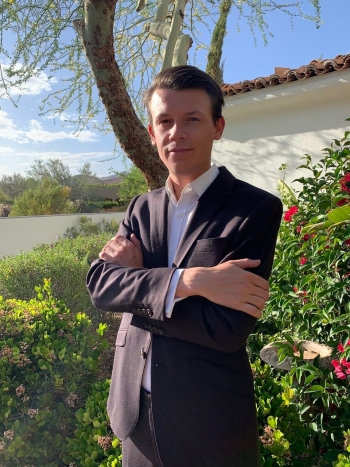Editor's note: This story is part of a series of profiles of notable spring 2022 graduates.
Thomas Bate is a deep thinker. The Scottsdale, Arizona, resident is graduating from Arizona State University in Barrett, The Honors College this spring with a Bachelor of Arts in English (literature) and a handful of accolades for his intellectual gifts.
The English degree is a natural fit for Bate, an immigrant from the U.K. who hails from a literary family. In fact, Bate’s writing is so good that it has garnered him several scholarships and awards from the Department of English, including the Homecoming Writing Contest (in 2019 and 2021 both) as well as the Nick Ivins Memorial Literature Scholarship (2021).
While seeming the prototypical young literature scholar, Bate’s planned career trajectory does not settle him in an armchair wearing a tweed smoking jacket.
On the contrary, Bate’s goals are to serve others. He plans to pursue a doctorate in clinical psychology and become a practicing psychotherapist.
With this aim in mind, Bate recently relocated to California for an internship — “which was a bit mad, since it was unpaid,” he admitted – at the American Institute for Behavioral Research and Technology.
His work there under psychologist Dr. Robert Epstein won him the Department of English’s High Impact Internship Award for 2022, a recognition given to students who take on internship work toward “the greater social good.”
Bate’s internship was intensive: “As a research intern,” he said in his application, “I have edited corrected proofs with ‘Dr. E,’ written fourteen IRBs (required documentation to ensure the ethical practice of experiments) and I am currently co-authoring a paper with Dr. E that will propose a questionnaire for determining the severity of ‘behavioral addictions’ in comparison to ‘substance abuse disorders’ — a key distinction yet to be made in the world of psychology.”
Bate said he’s an admirer of how the university combines academics with community embeddedness, calling the result a “brilliantly holistic educational experience.”
He also points to another of his best ASU experiences: an internship with the Pen Project Internship, where he edited and reviewed writings by prisoners at a New Mexico state penitentiary.
As his honors thesis, for which he received funding from Barrett, The Honors College, he wrote a novel under the supervision of fiction writer and ASU Professor of English T.M. McNally, an experience Bate said was “thrilling.”
Bate is grateful for the support he has received at ASU, both from the institution itself and from individual faculty and staff members.
We caught up with him (he was wearing a jacket, though it wasn’t tweed) to ask a few more questions about his ASU experience and his future plans.
Question: What was your “aha” moment, when you realized you wanted to study in your field?
Answer: I have always been fascinated with the human experience — those questions around who we are and why we do the things we do. English literature has always seemed to me the most accessible portal into this abstract world. As such, my “aha” moment has been continuous, as it is an exclamation made afresh with every book I read.
Q: What’s something you learned while at ASU — in the classroom or otherwise — that surprised you, that changed your perspective?
A: Something that I learned at ASU is that it is imperative to find, and then become, yourself. Often, people my age feel pressure to conform, but I have never felt that at ASU, despite its great size. Everywhere I look, I find people growing into the versions of themselves that they will one day become, living authentically and unapologetically, and I think it’s great.
Q: Why did you choose ASU?
A: I chose ASU because it is a dynamic and exciting university compared to many of the more antiquated and ossified alternatives. Coming to America as an immigrant from the United Kingdom, I have been fully introduced to the American “can-do” attitude that ASU takes so seriously. Consequently, this academic environment encourages risk-taking, big ideas and freethinking. This has enriched my studies. I have had support from ASU — both academic and financial — that I know I wouldn’t have received elsewhere, for which I am enormously grateful. Frankly, this just feels like the place to be!
Q: Which professor taught you the most important lesson while at ASU?
A: Professor T.M. McNally in the creative writing (program) has taught me the most. I will not forget the things I’ve learned from him. His best advice was never to write anything in order to be published: write because you want to write. I must also give a mention to my literature professor (Principal Lecturer) Steve Farmer, who told me early on to “stay away from Arthur Schopenhauer!” in my essays, for his outlook tends to bleakly taint one’s thoughts forever.
Alas, for me, it was too late ...
Q: What’s the best piece of advice you’d give to those still in school?
A: While I think it is paramount for people to work to the best of their abilities so as to live up to their full potential, I think it is also important not to lose sight of the wood for the trees. What I mean by that is, if in the course of your education you sacrifice elements of your mental health, sense of self-worth, social life and general personal development, in order to pursue the best possible life for yourself, you may find that you’ve actually made it harder to attain by doing so. You should prioritize self-care above all else while at school — and the funny thing is that if you do this, good grades will almost always follow as a result anyway.
Q: What was your favorite spot for power studying?
A: I always loved the Secret Garden, located very close to my dormitory in my first year.
Q: What are your plans after graduation?
A: After graduation, I am going to apply to graduate schools in order to pursue a doctoral degree in clinical psychology. My plan is to become a psychologist, therapist and writer.
Q: If someone gave you $40 million to solve one problem on our planet, what would you tackle?
A: One social problem that can certainly be solved with money is that of mental health. There is a real crisis of mental health at the moment — especially among my generation — which is causing great suffering both on the individual and societal level. I would allocate $40 million towards providing mental health care resources to underserved communities, who often need it most, in the form of therapeutic practices, health clinics and the distribution of helpful literature.
More Science and technology

Unlocking new pathways in regenerative medicine
In the quest to advance regenerative medicine, the Harris Lab at Arizona State University is making groundbreaking strides.…

Brilliant move: Mathematician’s latest gambit is new chess AI
Benjamin Franklin wrote a book about chess. Napoleon spent his post-Waterloo years in exile playing the game on St. Helena. John…

ASU team studying radiation-resistant stem cells that could protect astronauts in space
It’s 2038.A group of NASA astronauts headed for Mars on a six-month scientific mission carry with them personalized stem cell…
